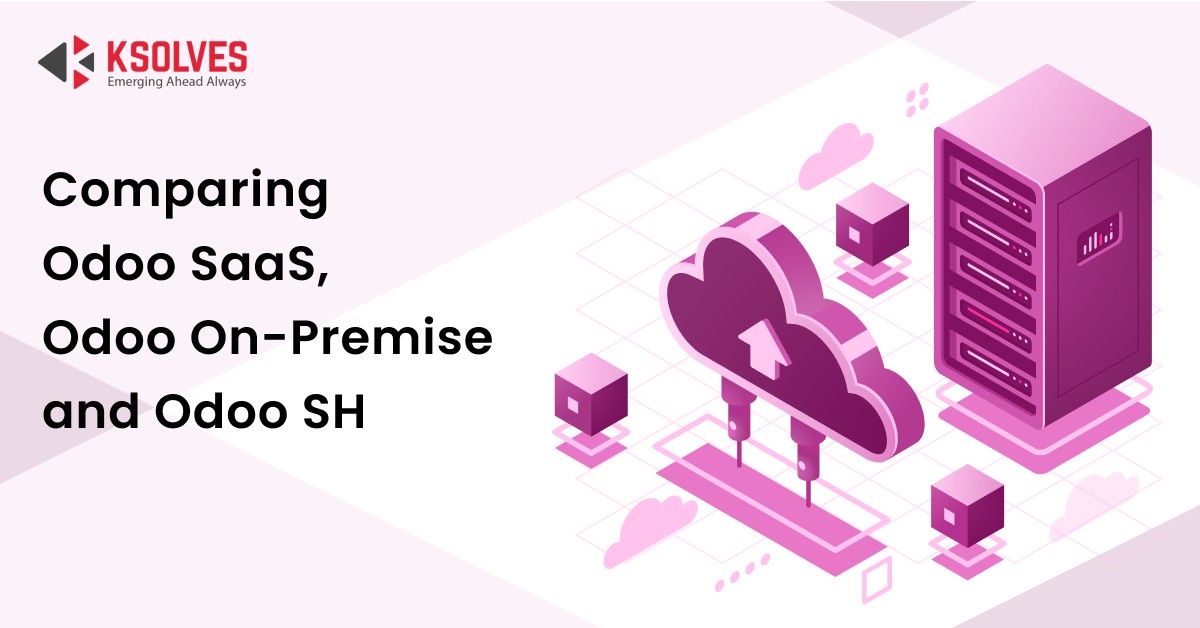Are you doubtful about which Odoo hosting environment to use? Selecting a hosting environment is an important decision to make before Odoo implementation, and you have full liberty to do so. In the world of business management, Odoo is a popular name. It’s an open-source ERP system that comes in three different options: Odoo SaaS, Odoo On-Premise, and SH. Each of these options has its own set of advantages and disadvantages, and businesses need to consider them carefully before choosing which one to use. This blog clearly compares Odoo SaaS, Odoo On-Premise, and SH.
Odoo SaaS
Odoo SaaS, also known as Software as a Service, is a cloud-based solution that allows businesses to use Odoo without having to manage any infrastructure. Your cloud instance will be ready to use anywhere and at any time in a matter of seconds and a couple of clicks. It even comes with a pre-configured email server! This means that businesses don’t have to worry about installing and maintaining servers or updating software. All of this is handled by Odoo’s team of experts, leaving businesses to focus on their core operations.
The most significant advantage of Odoo SaaS is its ease – you won’t have to worry about technical aspects because the platform handles everything. Odoo supervises the platform for optimal performance, and the 24 hours team ensures that the cloud platform scales as your business grows. Furthermore, their support team offers unlimited bug fixes and security updates.
Odoo SaaS: Advantages
Odoo SaaS is a cloud-based service, businesses can access it from anywhere, as long as they have a stable internet connection. This makes it ideal for companies with multiple locations or remote workers. It also means that businesses can easily scale up or down their usage based on their needs, without having to worry about infrastructure changes.
- Affordability: Pay for what you use
Since businesses don’t have to invest in hardware or software, the upfront costs are much lower than with other options. Additionally, businesses only pay for what they use, which can help them save money in the long run by reducing non-essential payments.
Odoo Saas: Disadvantage
One of the biggest concerns for businesses is data security. Since the data is stored on Odoo’s servers, businesses have to trust that Odoo has implemented proper security measures to protect their data. Additionally, businesses may not have as much control over customizations and integrations as they would with Odoo Premise.
Odoo On-Premise
Odoo On-Premise, also known as On-Premises, is a traditional deployment option that involves installing the software on a company’s own servers. This gives businesses more control over their data and infrastructure, as well as the ability to customize the software to fit their specific needs.
Odoo SA cannot provide any guarantee or Service Level Agreement regarding the robustness, performance, and scalability of your infrastructure, so this is only recommended for customers with advanced technical knowledge.
There are several technical aspects that you must handle to ensure the robustness and cost-effectiveness of your Odoo On-Premises installation. If you choose to work with a third-party provider, it is critical that you understand the terms of your contract as well as any additional costs that may arise. Here are the most important aspects mentioned below:
- The Service Level Agreement (SLA) guarantees uptime and scales with usage.
- Policy for disaster recovery should be discussed and agreed upon.
- Backup downloads and data policies should be made clear.
- The test environment should be specified.
- The responsibility for third-party app maintenance and upgrades should be defined.
Odoo On-Premise: Advantages
Businesses have full control over their infrastructure and can customize the software to fit their specific needs. This makes it a good option for companies with unique business processes or regulatory requirements.
Since the data is stored on a company’s own servers, businesses have more control over who has access to it and how it’s secured. This can be particularly important for businesses with sensitive data.
Odoo On-Premise: Disadvantages
Businesses have to invest in servers and hardware to support the software, which can be a significant expense. Additionally, businesses are responsible for maintaining the software, which can be time-consuming and require specialized expertise.
Odoo SH
Odoo SH is a third-party hosting option for Odoo. SH is an Odoo SA-managed PaaS (Platform as a Service). SH allows you to create your own cloud platform in just a few clicks. It also encompasses an email server. It’s a hybrid solution that combines the benefits of both Odoo SaaS and Odoo On-Premise. With SH, businesses get the flexibility and control of Odoo On-Premise, while also benefiting from the cloud-based infrastructure of Odoo SaaS.
Tools provided by Odoo SH:
- Database Replication
- Staging Servers
- Backup Servers\
- Automated Testing
- SSH Access
- DNS and Routes
- Email Gateways
Odoo SH: Advantages
- Affordability: Cost-effectiveness
Since businesses don’t have to invest in their own hardware or software, the upfront costs are lower than with Odoo Premise. Additionally, businesses only pay for what they use, which can help them save money in the long run.
Businesses have full control over their infrastructure and can customize the software to fit their specific needs. At the same time, they don’t have to worry about maintaining the infrastructure themselves, as that’s handled by the third-party hosting provider.
SH is intended for customized Odoo implementations, allowing you to install both certified and third-party apps from the Odoo apps store. It also has built-in tools to help with the development of new apps and custom features, such as:
- Integration with GitHub for code management
- Online editor for editing code
- Continuous integration for seamless deployment
- Development and staging environment for testing purposes
- Branch management for tracking, forking, merging, etc.
- Every new commit is subjected to automated testing to ensure code quality.
Odoo SH: Disadvantages
Odoo SH Paas version of the Odoo ERP software offers numerous advantages to users. However, there are some drawbacks to using Odoo SH, which include:
- Data Security: While Odoo SH ensures data security by hosting all data on its servers, some businesses may have reservations about having their sensitive information stored on a third-party server.
- Internet Connectivity: As Odoo SH is a cloud-based system, it requires a stable internet connection to function optimally.
- Limited Control: With Odoo SH, businesses have limited control over the software, including updates, patches, and server configurations. High-configuration server requirement can be a significant expense.
Conclusion
Finally, selecting the best Odoo hosting environment is dependent on a number of factors, including accessibility, affordability, flexibility, and security. Odoo SaaS is an excellent choice for companies looking for a cloud-based solution with minimal technical requirements and upfront costs. Odoo On-Premise is ideal for companies that want complete control over their data and infrastructure, but it has higher costs and technical requirements. SH provides a hybrid solution that combines the advantages of both options, allowing for greater flexibility, control, and cost-effectiveness. Finally, before deciding on an option, businesses should carefully consider their specific needs and current requirements and also should have foresightedness of their requirement growth in the future.
It is recommended that you seek the assistance of a professional service provider such as Ksolves India Limited – an established Odoo Gold Partner – if you want to implement Odoo for your business. Ksolves’ expertise and experience can help you identify the best fit for your requirement, maximize your Odoo investment and ensure a successful implementation. Invest in Odoo today to gain unprecedented control over your business operations!






AUTHOR
Share with